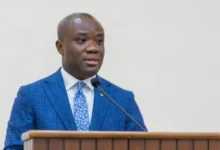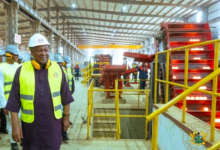
The United Kingdom (UK) government has announced an investment of about £1.9 million to bolster economic growth in West Africa through science, technology, and innovation (STI).
The funding, part of the West Africa Research and Innovation Hub, aims to enhance innovation in Ghana and Nigeria, build on existing partnerships and strengthen the region’s capacity to develop and commercialise innovative solutions.
The UK minister for Africa, Lord Collins of Highbury, who made the announcement at a press conference in Accra yesterday, emphasised that the investment would go a long way to support Ghana to improve its developmental activities.
The press conference was part of his maiden two-day visit to Ghana and West Africa. While in Ghana, he engaged stakeholders on issues of importance to Ghana and UK.
Lord Collins noted that research could be harnessed for economic growth.
As part of commitment to a greener future, Lord Collins explained that the UK government had allocated substantial funds to support the development of charging battery technologies, thereby offering a viable substitute for fossil fuels in vehicles and contributing to the reduction of air pollution and climate change.`
Lord Collins further urged collaboration between governments and the private sector, noting that this had the potential to yield mutually-beneficial outcomes through strategic partnerships.
“By fostering a collaborative environment, both parties can leverage each other’s strengths to achieve common goals, such as driving economic growth, improving public services, and addressing societal challenges”, he explained.
For his part, the Minister of Transport, Mr Kwaku Ofori Asiamah, said that the investment would fuel innovation and drive the pursuit of knowledge and business expansion.
“I am excited because we have been presented with yet another opportunity to further boost our commitment to scaling up the adoption of technology and innovation and achieve our goal of decarbonising the transport sector”, he said .
Mr Asiamah stressed the government’s commitment to the decarbonisation of transport and energy sectors, despite the looming climate crisis as contained in the new National Electric Vehicle Policy and the National Energy Transition Framework.
The Minister noted that the private sector played a crucial role in development and that the government would ensure that new start-ups were given the necessary support needed to sustain them.
“I believe as we make progress with the implementation of our decarbonisation policies, the private sector will continue to work collaboratively with government to accelerate the transition effectively,” he noted.
Mr Asiamah also indicated that there were about six charging outlets that were accessible to the public for charging of electronic motors. .
The Chief Executive of Kofa, Mr Erik Nygard, said that there was the need for the government to create a conducive environment for Small Medium Enterprises (SMEs), since the country solely relied on it for development.
“By supporting Kofa, Pash and similar innovative ventures, the UK aims to stimulate economic growth while ensuring energy equity,” he said.
In attendance were representatives from Kofa, an electric battery company, staff of ministries, Small and Medium Enterprises (SMEs) and key private sector players in the industry.
BY AGNES OWUSU







